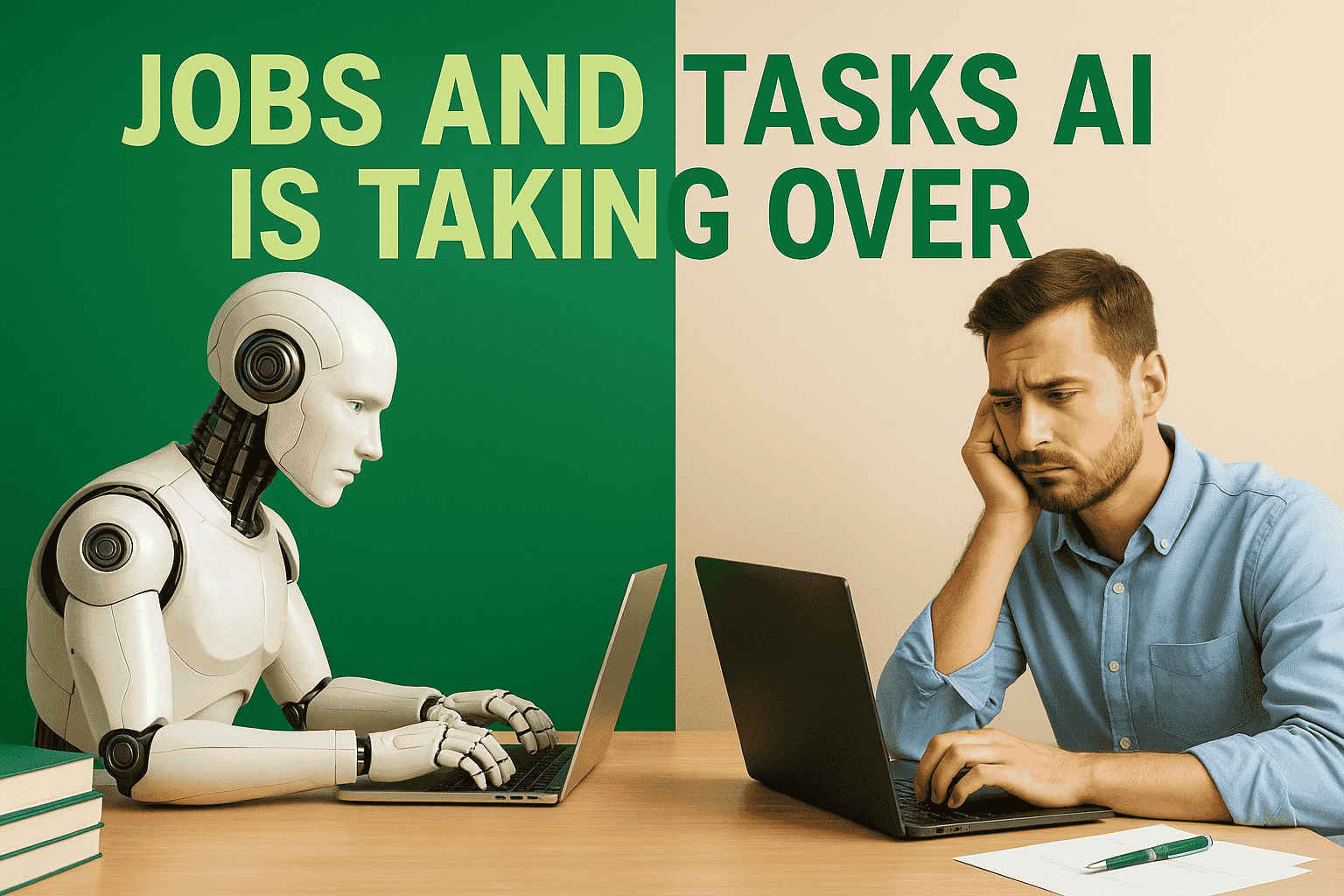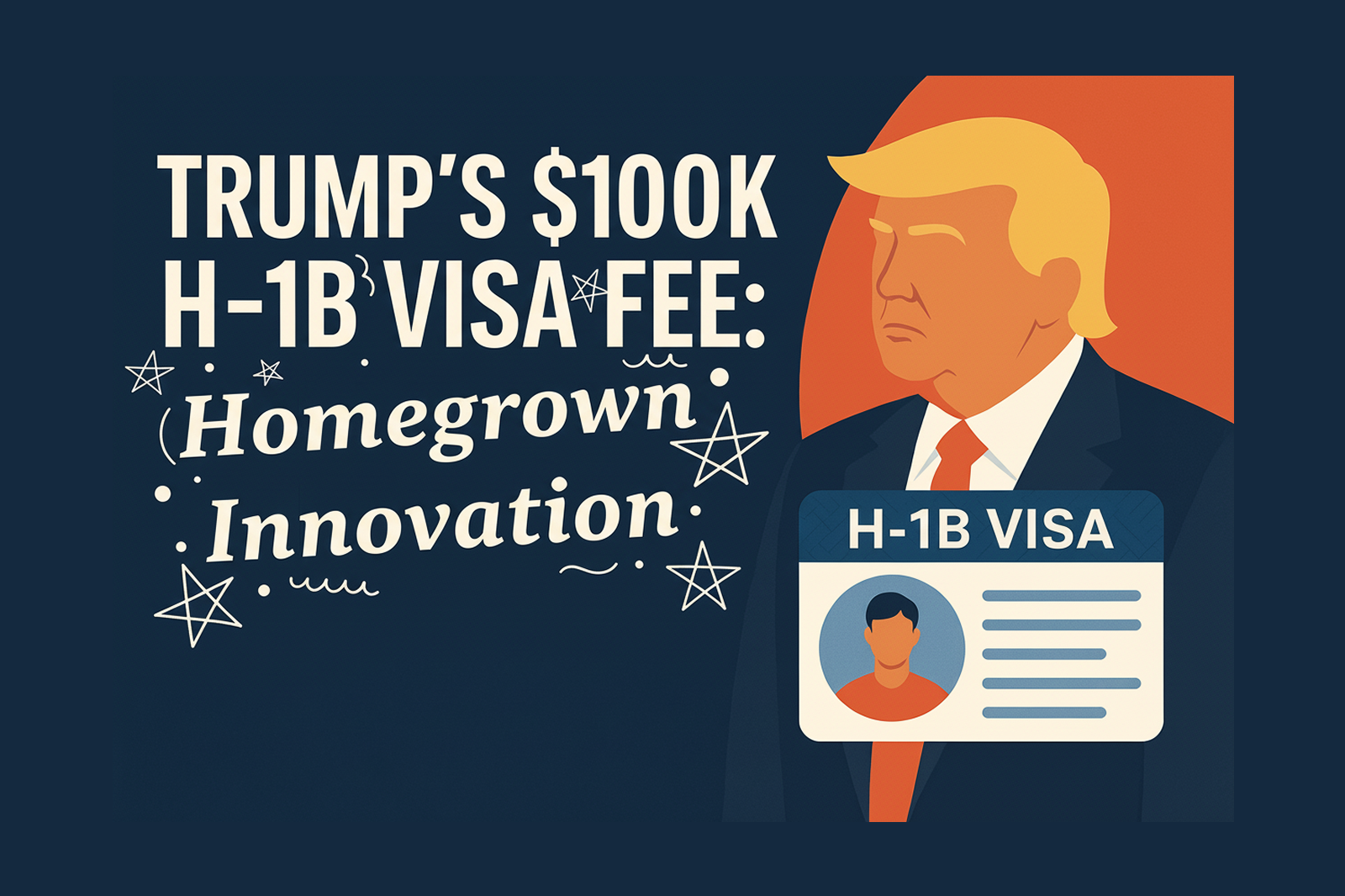AI’s First Wave of Job Loss Hits Disproportionately Hard in the Black Community
Ali Muwwakkil
·
7 minute read
Sam Altman’s Warning: Customer Service Jobs at Risk
OpenAI CEO Sam Altman recently predicted that artificial intelligence will first disrupt customer service jobs, potentially wiping out entire call-centre and support teams. In an interview, Altman stated he’s “confident that a lot of current customer support that happens over a phone or computer… will lose their jobs, and that’ll be better done by an AI”
Prefer watching over reading?
Watch our podcast below:
Prefer listening over reading?
listen to our podcast below:
-png.png?width=1600&height=1066&name=Guide%205%20(1)-png.png)
He even suggested that what usually takes decades of workforce change could be compressed into just a few years as AI technology rapidly advances. While Altman noted that such upheavals have historical precedent – roughly 50% of jobs change significantly every few generations – the speed of this AI-driven shift may be unprecedented. Professions that rely on deep human connection (for example, nursing) might be safer, according to Altman, but many white-collar roles (even programming) could face uncertainty in the coming decade.
In short, a major wave of job turnover is looming, and customer service workers are on the front line of this change.
Black Workers in Customer Service: Disproportionate Representation
Altman’s forecast carries serious implications for the Black community in the United States. Customer service has been a key source of jobs for Black workers – in fact, Black Americans are overrepresented in these roles. Roughly 3 million Americans work as customer service representatives and nearly one in five of them are Black. By comparison, Black workers make up about 13% of the overall U.S. labour force.
This means Black employees hold a disproportionately large share of customer service jobs relative to their share of all jobs. Put another way, upwards of half a million Black Americans are employed in customer support roles that AI could soon render obsolete. There are several reasons for this concentration. Customer service roles—such as call centre agents, support specialists, and retail customer care—have often been more accessible to workers of colour, including those without advanced degrees. These jobs, while sometimes low-paying and stressful, have provided stable employment for many Black families. Black women in particular are heavily represented in customer-facing service occupations, given that around two-thirds of customer service workers are female.
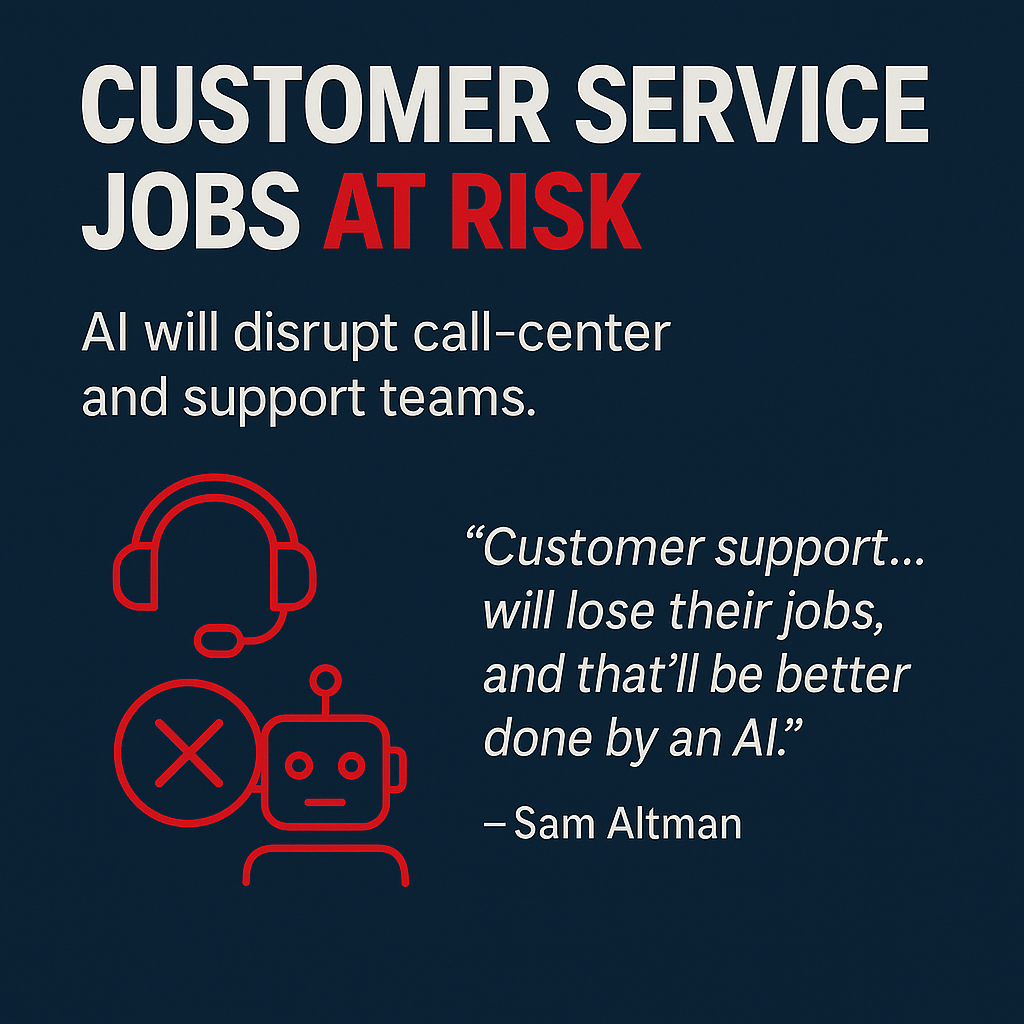
Research confirms the trend: Black workers are overrepresented in 17 of the 30 U.S. occupations at highest risk of automation (including roles like retail sales, cashiers, and support staff). In contrast, Black workers are underrepresented in many of the low-risk, high-paying tech jobs that are less likely to be replaced by AI. This unequal distribution means any AI-driven shake-up in service jobs will hit Black communities harder than others.
Economic Risks: Unemployment and Community Impact
If AI systems eliminate large numbers of customer service jobs, the immediate fallout could be a spike in unemployment for Black workers. Unemployment in Black communities is already a concern – historically, the Black unemployment rate has been about double that of white Americans.
For example, in 2022 Black unemployment hovered around 6%, versus ~3% for white workers.
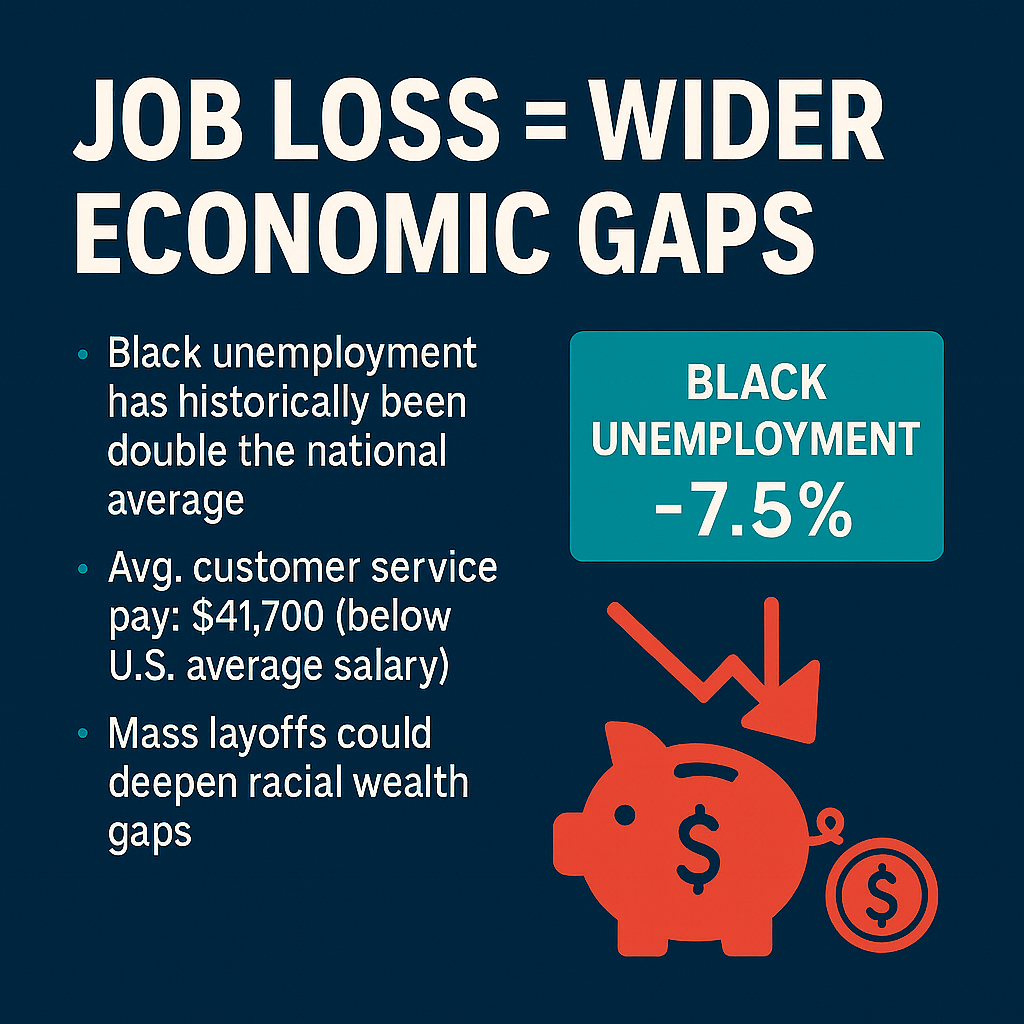
Sudden job losses in a sector so heavily staffed by Black employees could drive that gap even wider. Each percentage-point uptick in joblessness represents thousands of individuals losing wages, benefits, and stability. The ripple effects spread to families and neighbourhoods: lost income can mean increased poverty rates, housing insecurity, and reduced consumer spending in Black communities that are already contending with racial wealth gaps and fewer economic opportunities.
There’s also the quality of work to consider. The customer service roles at risk, while not high-paying (the average customer service rep earns about $41,700, far below the U.S. average salary, at least provide a paycheck and often health insurance or other benefits. If these jobs vanish, many displaced workers might be forced into part-time gigs or lower-wage work.
Some labour historians warn that technology-driven shifts can erode job quality:
During the Industrial Revolution, for instance, skilled artisans lost their livelihoods and were pushed into dangerous factory jobs at a fraction of the pay – “just about everyone loses except the factory owners,” as one historian noted of that era. The modern parallel would be if AI replaces decently paid customer support reps with a handful of tech specialists and a mass of unstable gig roles. Without intervention, the economic divide could deepen, leaving many Black workers in a precarious position. At the same time, some experts are cautiously optimistic that technology will eventually create new jobs to offset the losses. In past disruptions, increased productivity sometimes led to higher demand in other areas – for example, the automation of certain tasks can lower costs and expand markets, potentially generating new employment (as happened when the cotton gin increased demand for cotton textiles).
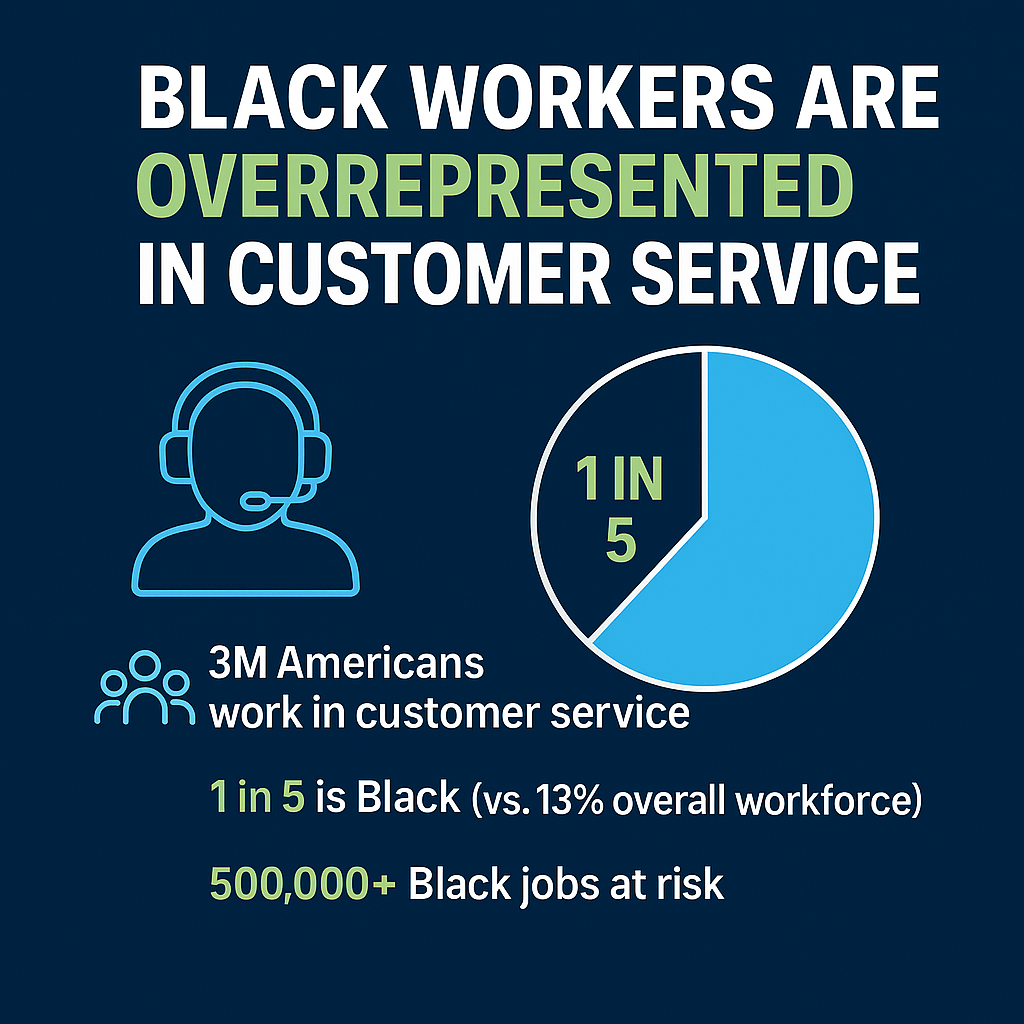
However, even optimistic analysts like Ethan Mollick acknowledge that in the short term there will be “a lot of disruption” and pain before any benefits appear. For Black communities that have historically borne the brunt of economic downturns first and recovered last, the short-term turbulence of an AI revolution is cause for real concern. The need for proactive solutions is urgent to ensure this “jobs apocalypse” scenario does not permanently harm Black workers’ livelihoods.
Reskilling for the AI Era: A Path Forward with Colaberry
Preparing people for new careers is one of the most promising responses to the coming AI shake-up. Policymakers and educators increasingly emphasize the importance of reskilling and upskilling workers from vulnerable sectors. In a 2023 Federal Reserve analysis, experts urged investment in education and workforce training to help those most at risk – noting that to avoid widening racial disparities, we must equip workers with skills for the “Fourth Industrial Revolution” of AI. This is especially critical for Black workers exiting fields like customer service. By gaining new, in-demand skills, displaced employees can transition into growing industries rather than being left behind. It’s a strategy to turn a potential crisis into an opportunity for career evolution.
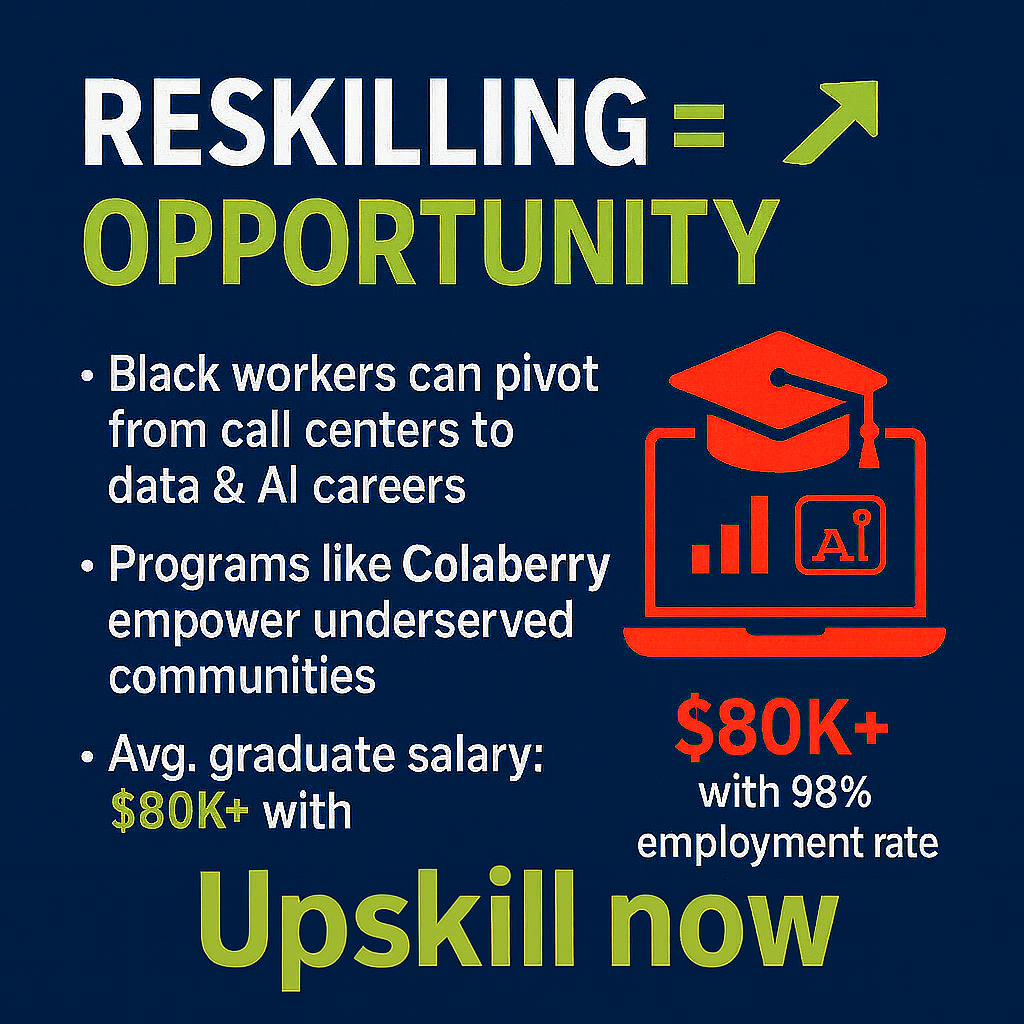
One example of a reskilling initiative making a difference is Colaberry, a data science and analytics training program. Colaberry’s mission is to “empower underserved individuals amidst the challenges of workplace automation and unemployment.” It provides proven career pathway solutions that focus on cultivating tech skills and “transforming these skills into well-paid, meaningful jobs in the ever-evolving workplace,” all while ensuring individuals and their families achieve a higher quality of life through education training.colaberry.com.
In plain terms, Colaberry takes people who may have no prior tech experience – a former call center rep, a retail associate, even someone coming from military service or teaching – and trains them to become data analysts, data scientists, and AI professionals. The programs are intensive but accessible (lasting a few months to under a year, and offered online or in-person). Participants learn not only technical skills (like SQL, Python, machine learning) but also crucial “human skills” such as communication and problem-solving, which are vital in tech fields. This dual focus helps graduates adapt to the fast-paced digital economy with confidence.
Crucially, Colaberry and similar programs have a track record of success. Since its founding in 2012, Colaberry has helped over 5,000 people transform their careers through its bootcamp-style courses. Many of those graduates come from backgrounds underrepresented in tech – exactly the communities most threatened by automation. The outcome statistics are inspiring:
An average starting salary for workers with data and AI skills is around $60,000-$90,000. By comparison, a typical customer service job might pay around $30,000–$40,000, so this represents a life-changing jump in income for successful career transitioners. Over one-third of Colaberry graduates even receive job offers after their very first post-bootcamp interview, a testament to how well-regarded their training is by employers.
These aren’t just numbers – they translate into real stories of improved lives for several Colaberry School Alumni.
These aren’t just numbers – they translate into real stories of improved lives for several Colaberry School Alumni.
For example, one alumna, Shyni, was working in a customer service job when her boss, who had also gone through the Colaberry program, told her she should join before leaving the company herself. This recommendation highlights how the program empowers individuals to transition into more promising careers.
Another graduate, a former military serviceman, said his reasonable investment in retraining led to “significant income growth” and more flexibility for family life. These case studies illustrate that with the right support, workers can pivot from vulnerable jobs to thriving careers in tech. Colaberry’s focus on the “underserved” is particularly relevant for the Black community. Programs like this strive to democratize access to tech education, recruiting people who might not see themselves in Silicon Valley and giving them the skills to break into a high-demand field.
This includes mentorship, project-based learning on real-world scenarios, and job placement assistance until graduates land a role. By lowering financial barriers (through scholarships, payment plans, etc.) and creating an inclusive learning environment, such bootcamps make it feasible for a laid-off customer service agent – perhaps someone with only a high school diploma – to become a business intelligence analyst or junior data scientist within months. The larger vision is not just to get individuals a job, but to build generational wealth and stability in communities of color by opening doors to careers in the tech and AI sector, where median salaries and growth prospects are far better. As Colaberry puts it, they aim to “ensure that all individuals, especially the underserved, have the opportunity to thrive in the digital age of Data & AI”
Want to start your carrier in Data Analytics & Ai. Register now for our Open House.
Turning Challenge into Opportunity
The impending wave of AI-driven job displacement is a pivotal challenge – especially for Black Americans who have often been on the frontline of economic disruptions. The fact that AI is set to take over roles heavily occupied by Black workers is a cause for concern, but it is not a foretold disaster. It can instead be a catalyst for change. History has shown that the workforce can adapt to technological revolutions, though not without pain. The key is proactive adaptation: with targeted training, education, and investment in human capital, the communities most at risk can develop resilience. In the face of Altman’s prediction – customer service jobs vanishing into the silicon maw of AI – the Black community is responding not with resignation, but with reinvention. Grassroots efforts, nonprofits, and training academies like Colaberry are helping workers leap from declining industries into the jobs of the future. Emotionally, the transition may be daunting. It’s hard to tell someone who has spent 20 years in a service call center that they must learn to code or analyze data to stay relevant. There is fear of the unknown, and legitimate concerns about age, bias, and financial constraints in switching careers.
Yet, the case study unfolding today demonstrates that these hurdles can be overcome. We see mid-career parents learning Python at night, friend groups signing up for data bootcamps after a round of call-center layoffs, and Black professionals networking to get their foot in the door of tech firms. Each success story chips away at the notion that AI will inevitably lead to mass unemployment. Instead, it frames the narrative around empowerment: AI might take away certain jobs, but it can also create new ones – and with the right preparation, Black workers can capture those new opportunities. In conclusion, Sam Altman’s prediction serves as a wake-up call. Yes, AI is poised to reshape the job market at a historic pace, and yes, Black communities have a disproportionate stake in the outcome due to their representation in at-risk customer service roles. The potential for increased hardship is real.
However, as this case study illustrates, there is also a path forward. By investing in people – in skills training, education, and inclusive programs – we can buffer the shock of automation. Black workers who once manned phones and chats can become the data analysts, AI developers, and tech consultants of tomorrow. The same technology that threatens to upend jobs can be leveraged to train and elevate a new generation of talent. The Black community has a long history of ingenuity and resilience in the face of economic adversity. With the advent of AI, that resilience is being tested once again. The early results show that with communal support, forward-thinking training programs, and sheer determination, Black workers can transform an AI-driven jobs crisis into an opportunity to climb the economic ladder.
In the story of AI and the future of work, the chapters for Black America are still being written – and they are filled with hope, innovation, and the unwavering pursuit of a better future.
Want to start your carrier in Data Analytics & Ai. Register now for our Open House.


